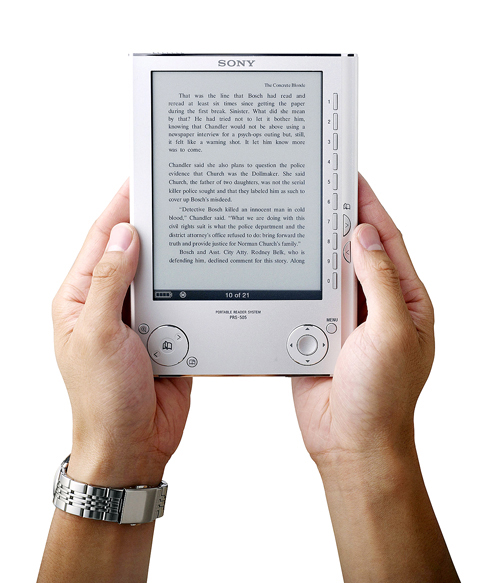Electronic books are often mentioned in the same breath as Amazon.com Inc’s Kindle digital reader. Now e-book rival Sony Corp is determined to recapture consumers’ attention with a smaller reader that’s also US$100 cheaper.
Sony was expected to announce yesterday that it would release the Reader Pocket Edition by the end of this month. It will retail for US$199, a third off the price of the basic Kindle model and about US$80 less than Sony’s PRS-505 reader, which will be discontinued.
The device is entering a small but growing market. US e-book sales totaled US$113 million last year — up 68 percent from 2007 but still a fraction of the estimated US$24.3 billion spent on all books, the Association of American Publishers said.

PHOTO: REUTERS
Steve Haber, president of Sony’s digital reading business division, expects the Pocket Edition’s price tag will lure new consumers who haven’t wanted to shell out for such a device thus far.
Sarah Rotman Epps, a media analyst at Forrester Research, said the Pocket Edition’s price below US$200 breaks an important psychological barrier.
“This is something that is affordable for the holiday season, and I think that you’ll see sales of e-readers outpacing current forecasts,” she said.
She forecast sales of 2 million digital reading devices this year, compared with a little more than 1 million sold by the end of last year.
She doesn’t expect Amazon to rest on its laurels, adding that the online retailer will have to respond to counter Sony’s new price point.
A big difference between Sony’s Readers and Amazon’s Kindle has always been the lack of wireless access for quick and simple downloads of books. The new models are no different: They have to be connected to a computer to acquire books.
For the first time, they will be compatible with PCs and Mac computers, though. Sony will offer current Reader owners a software update to make theirs compatible with both.
As he has indicated in the past, Haber said Sony is working on a wireless model, though he wouldn’t say when.
Sony is also adjusting prices to some of the e-books it sells through its online eBook Store. New releases and best-sellers will now sell for US$10, US$2 less than current prices. Amazon’s Kindle Store offers most best-sellers and new releases for US$10.
Sony’s eBook Store includes more than 100,000 books, as well as a million free public-domain books available from Google Inc through its Google Books project. The Kindle Store has more than 330,000 available titles.
The Kindle can only download books from Amazon’s store, while Sony’s Readers can display texts sold in the “epub” format — an open standard supported by the International Digital Publishing Forum that numerous publishers use to make e-books.

Taiwanese actress Barbie Hsu (徐熙媛) has died of pneumonia at the age of 48 while on a trip to Japan, where she contracted influenza during the Lunar New Year holiday, her sister confirmed today through an agent. "Our whole family came to Japan for a trip, and my dearest and most kindhearted sister Barbie Hsu died of influenza-induced pneumonia and unfortunately left us," Hsu's sister and talk show hostess Dee Hsu (徐熙娣) said. "I was grateful to be her sister in this life and that we got to care for and spend time with each other. I will always be grateful to

REMINDER: Of the 6.78 million doses of flu vaccine Taiwan purchased for this flu season, about 200,000 are still available, an official said, following Big S’ death As news broke of the death of Taiwanese actress and singer Barbie Hsu (徐熙媛), also known as Big S (大S), from severe flu complications, the Centers for Disease Control (CDC) and doctors yesterday urged people at high risk to get vaccinated and be alert to signs of severe illness. Hsu’s family yesterday confirmed that the actress died on a family holiday in Japan due to pneumonia during the Lunar New Year holiday. CDC Deputy Director-General Tseng Shu-hui (曾淑慧) told an impromptu news conference that hospital visits for flu-like illnesses from Jan. 19 to Jan. 25 reached 162,352 — the highest

TAIWAN DEFENSE: The initiative would involve integrating various systems in a fast-paced manner through the use of common software to obstruct a Chinese invasion The first tranche of the US Navy’s “Replicator” initiative aimed at obstructing a Chinese invasion of Taiwan would be ready by August, a US Naval Institute (USNI) News report on Tuesday said. The initiative is part of a larger defense strategy for Taiwan, and would involve launching thousands of uncrewed submarines, surface vessels and aerial vehicles around Taiwan to buy the nation and its partners time to assemble a response. The plan was first made public by the Washington Post in June last year, when it cited comments by US Indo-Pacific Commander Admiral Samuel Paparo on the sidelines of the Shangri-La Dialogue

Suspected Chinese spies posing as Taiwanese tourists have been arrested for allegedly taking photographs of Philippine Coast Guard ships, local media reported. The suspected spies stayed at a resort in Palawan, where from a secluded location they used their phones to record coast guard ships entering and leaving a base, Philippine TV network GMA said on Wednesday. Palawan is near the Spratly Islands (Nansha Islands, 南沙群島) and other disputed areas of the South China Sea, where tensions have been on the rise between China and the Philippines. The suspects allegedly also used drones without permission and installed cameras on coconut trees in the